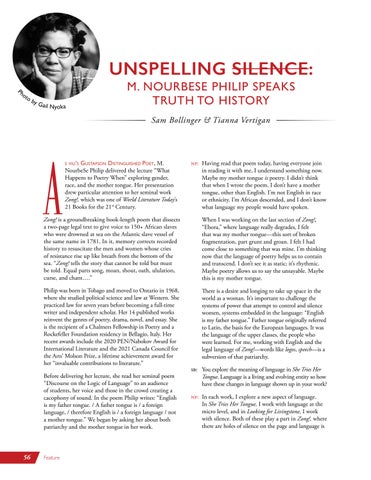UNSPELLING SILENCE: P
ho
to
by
G ai l N
yoka
M. NOURBESE PHILIP SPEAKS TRUTH TO HISTORY Sam Bollinger & Tianna Vertigan
s viu’s Gustafson Distinguished Poet, M. NourbeSe Philip delivered the lecture “What Happens to Poetry When” exploring gender, race, and the mother tongue. Her presentation drew particular attention to her seminal work Zong!, which was one of World Literature Today’s 21 Books for the 21st Century.
np: Having read that poem today, having everyone join in reading it with me, I understand something now. Maybe my mother tongue is poetry. I didn’t think that when I wrote the poem. I don’t have a mother tongue, other than English. I’m not English in race or ethnicity. I’m African descended, and I don’t know what language my people would have spoken.
Zong! is a groundbreaking book-length poem that dissects a two-page legal text to give voice to 150+ African slaves who were drowned at sea on the Atlantic slave vessel of the same name in 1781. In it, memory corrects recorded history to resuscitate the men and women whose cries of resistance rise up like breath from the bottom of the sea. “Zong! tells the story that cannot be told but must be told. Equal parts song, moan, shout, oath, ululation, curse, and chant….”
When I was working on the last section of Zong!, “Ebora,” where language really degrades, I felt that was my mother tongue—this sort of broken fragmentation, part grunt and groan. I felt I had come close to something that was mine. I’m thinking now that the language of poetry helps us to contain and transcend. I don’t see it as static; it’s rhythmic. Maybe poetry allows us to say the unsayable. Maybe this is my mother tongue.
Philip was born in Tobago and moved to Ontario in 1968, where she studied political science and law at Western. She practiced law for seven years before becoming a full-time writer and independent scholar. Her 14 published works reinvent the genres of poetry, drama, novel, and essay. She is the recipient of a Chalmers Fellowship in Poetry and a Rockefeller Foundation residency in Bellagio, Italy. Her recent awards include the 2020 PEN/Nabokov Award for International Literature and the 2021 Canada Council for the Arts’ Molson Prize, a lifetime achievement award for her “invaluable contributions to literature.”
There is a desire and longing to take up space in the world as a woman. It’s important to challenge the systems of power that attempt to control and silence women, systems embedded in the language: “English is my father tongue.” Father tongue originally referred to Latin, the basis for the European languages. It was the language of the upper classes, the people who were learned. For me, working with English and the legal language of Zong!—words like logos, speech—is a subversion of that patriarchy.
A
Before delivering her lecture, she read her seminal poem “Discourse on the Logic of Language” to an audience of students, her voice and those in the crowd creating a cacophony of sound. In the poem Philip writes: “English is my father tongue. / A father tongue is / a foreign language, / therefore English is / a foreign language / not a mother tongue.” We began by asking her about both patriarchy and the mother tongue in her work.
56
Feature
sb: You explore the meaning of language in She Tries Her Tongue. Language is a living and evolving entity so how have these changes in language shown up in your work? np: In each work, I explore a new aspect of language. In She Tries Her Tongue, I work with language at the micro level, and in Looking for Livingstone, I work with silence. Both of these play a part in Zong!, where there are holes of silence on the page and language is
